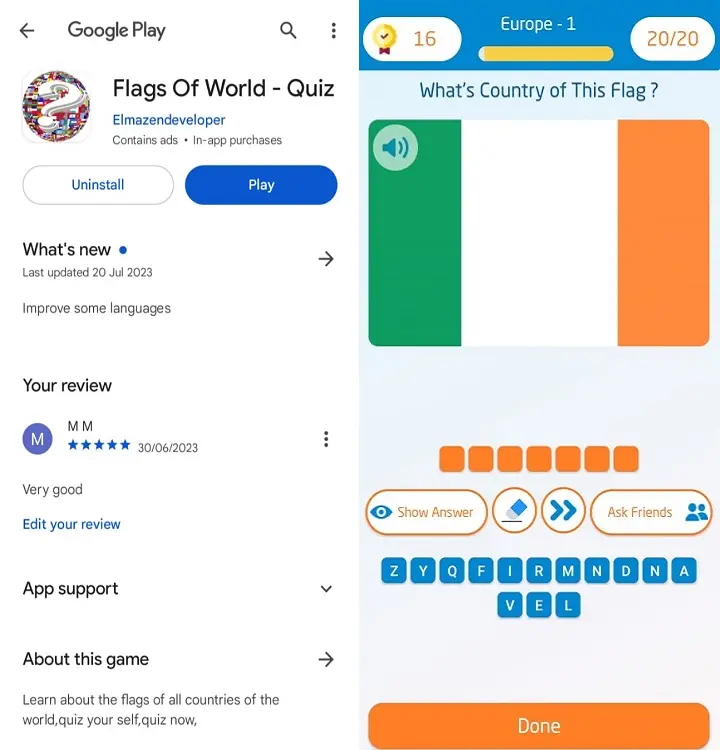Flag of Ireland
Flag of Ireland, Currency, Population, Tourist Places, Borders, Culture
Ireland: A Guide to the Emerald Isle
Ireland, often referred to as the "Emerald Isle" due to its lush, green landscapes, is a country rich in history, culture, and natural beauty.
Whether you're interested in its vibrant cities or its storied past, Ireland offers something for everyone.
Here’s an overview of some key aspects of Ireland that every visitor or reader should know.
Flag of Ireland, Currency, Population, Tourist Places

Download the application  Flags Of World - Quiz ,
Flags Of World - Quiz ,
And test your knowledge with Flags of World ,
1. Population of Ireland :
As of December 2024, the population of Ireland is approximately 5.28 million people.
The Republic of Ireland (distinct from Northern Ireland, which is part of the United Kingdom) is growing steadily, with most of the population living in urban areas like the capital, Dublin, and other cities such as Cork, Limerick, and Galway.
The population is diverse and multicultural, with a rich heritage rooted in its Celtic origins.
2. Ireland's National Flag: Meaning and Symbolism :
Ireland’s flag, known as the Irish Tricolour, consists of three vertical bands: green, white, and orange.
Each color holds deep symbolic meaning:
Green represents the Irish Catholics and the nationalist tradition.
- Orange stands for the Irish Protestants and the supporters of William of Orange.
- White symbolizes peace and unity between the two groups.
This flag was first used in 1848 by Irish nationalists and has since become a symbol of Ireland's independence and hope for peace between different communities.
3. Currency of Ireland :
Ireland’s official currency is the **Euro (€)**, abbreviated as EUR.
This has been the currency since Ireland joined the Eurozone in 1999, replacing the Irish Pound (Punt).
The use of the Euro makes Ireland convenient for travelers from other European Union countries that also use the currency.
4. Ireland's Borders :
The Republic of Ireland is an island nation located in northwestern Europe.
It occupies most of the island of Ireland, while Northern Ireland, which belongs to the United Kingdom, occupies the northeastern part.
Therefore, Ireland has only one land border, which is with Northern Ireland (part of the UK).
It is surrounded by the Atlantic Ocean, with the Irish Sea to the east, separating it from Great Britain, and the Celtic Sea to the south.
Flag of Ireland, Currency, Population, Tourist Places

Download the application  Flags Of World - Quiz ,
Flags Of World - Quiz ,
And test your knowledge with Flags of World ,
5. Culture of Ireland :
Irish culture is famous around the world, particularly for its contributions to literature, music, and dance.
Here are some highlights of Irish culture:
Music: Traditional Irish music, characterized by instruments like the fiddle, tin whistle, and bodhrán (a type of drum), plays a huge role in the country's cultural identity.
Irish folk music and contemporary rock bands, such as U2, have brought global recognition to the country.
Language: While English is the most widely spoken language, Irish Gaelic (Gaeilge) is also an official language and is taught in schools.
Some regions, known as the Gaeltacht, predominantly speak Irish.
Literature: Ireland has produced some of the most famous writers in history, including James Joyce, W.B. Yeats, Oscar Wilde, and Samuel Beckett.
The country’s storytelling tradition is deeply embedded in its national identity.
Festivals: Saint Patrick's Day (March 17) is the most widely celebrated festival, not only in Ireland but around the world, where Irish heritage is celebrated with parades, music, and the wearing of green.
Sports: Gaelic sports, such as hurling and Gaelic football, are integral parts of Irish culture.
The GAA (Gaelic Athletic Association) promotes these sports, and they enjoy huge support across the country.
6. Best Places to Visit in Ireland :
Ireland is known for its stunning landscapes, historical landmarks, and lively cities.
Some of the best places to visit include:
Dublin:
Ireland’s capital is a vibrant city known for its rich history, bustling pubs, and landmarks like Trinity College (home to the Book of Kells), Dublin Castle, and St. Patrick's Cathedral.
Temple Bar, famous for its nightlife, is a must-visit.
Cliffs of Moher:
These majestic cliffs on the west coast of Ireland offer breathtaking views over the Atlantic Ocean and are one of the country’s most visited natural attractions.
Ring of Kerry:
A scenic drive in County Kerry, this route takes you through some of Ireland’s most stunning landscapes, including rugged coastlines, charming villages, and mountain ranges.
Galway:
A lively cultural hub, Galway is known for its arts scene, medieval history, and proximity to the wild beauty of Connemara.
Blarney Castle:
Located near Cork, this iconic castle is famous for the Blarney Stone.
Legend has it that kissing the stone gives you the "gift of the gab," or great eloquence.
Giant’s Causeway:
Though technically in Northern Ireland, this UNESCO World Heritage site is a natural wonder with its unique hexagonal basalt columns formed by volcanic activity millions of years ago.
Kilkenny:
This medieval city is home to Kilkenny Castle and is known for its vibrant arts and crafts scene, as well as its historical significance.
Whether you're drawn to its ancient castles, literary heritage, or breathtaking natural beauty, Ireland has something to offer everyone.
Its rich culture, friendly people, and stunning landscapes make it a must-visit destination in Europe.
Flag of Ireland, Currency, Population, Tourist Places
